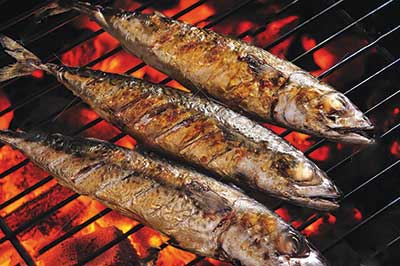There is no part of this country where one cannot get fish (eja in Yoruba, kifi in Hausa and azu in Igbo) to buy in any form: fresh, frozen, fried or smoked. The coastal areas, especially Lagos, get a lot of fish, which dieticians have said is better than meat, for animal protein.
 According to Mabel Idiagbonya, a nutritionist, eating plenty of fish on a regular basis can protect one from serious diseases. This super sea food is packed with vitamins, minerals and a major source of omega-3 fatty acid.
According to Mabel Idiagbonya, a nutritionist, eating plenty of fish on a regular basis can protect one from serious diseases. This super sea food is packed with vitamins, minerals and a major source of omega-3 fatty acid.
“Eating oily fish can help to reduce the risk of heart disease and improve your chances of survival following a heart attack because fish oils also appear to help reduce blood clotting and abnormal heart rhythms after a heart attack,” she explained.
Omega-3 fatty acids are believed to raise levels of the brain chemical, serotonin, which can help to ease depression, even as the selenium in shellfish, such as crab and lobster, has cancer-fighting properties.
Varieties
Fortunately, Nigeria is blessed with variety of fishes that many people have never seen or heard about. Most of them are localised, but the popular ones can be categorised into white, oily and shell.
Tilapia (epiya in Yoruba), catfish (okpo in Igbo and aro in Yoruba) and cod (panla in Yoruba and okporoko in Igbo, when air-dried,) are some of the popular white fishes in the market. While oily ones include mackerel and sardine. Prawns, crayfish (isha in Igbo and ede in Yoruba), lobster and periwinkle are shell fishes.
To get the fishes, you have to ask them by their local names or the people selling them. Thus, there is eja Egun (fish sold by Egun people from Badagry), agbodo/efolo (nwanyashishi in Igbo) popularly sold at Oyingbo and Iddo market and kifi worushe/doza (popularly sold by the Hausa)
Then there are the popular frozen ones in the market like kote, titus, croacker, panla (cod).
The fresher the better
Care must be taken in buying fish, especially fresh ones. The first thing about fresh fish is its wet look.
Grace Yetonyon, an Egun fish seller at Bariga market, disclosed that the scales should neither be dry nor coming off the body, which is why the sellers usually sprinkle water on them on display.
“The eyes should be clear and the gills rich red. It should smell like clean water and, when touched, the flesh should spring back. Just look for life in them, especially crabs and prawns,” she counselled.
The frozen ones could have been in the freezer for weeks, so it takes a lot of skills to know good ones. However, it is safer to buy from cold rooms that sell frequently.
Preparation
“In my place, we don’t throw out fish that is gradually going stale. I only have to spice it up locally and use it to make what we call obe egbe (stale soup),” explained Bimbo Ebietomiye from Ondo State.
Fresh fish is usually used for stew or pepper soup, while other forms, like dried and smoked, are the best bet for other soups like vegetable or egusi (melon), as they contribute to flavor in soups.
To use dried or smoked fish, it must be thoroughly washed with salt and running water, to completely remove sand particles.
However, if it is stockfish (okporoko), it has to be soaked in hot salted water or boiled to tenderise and soften it.
Fish can be steamed and deboned for use in some other dishes, while the grilled one goes well with chips and chilled drinks.











